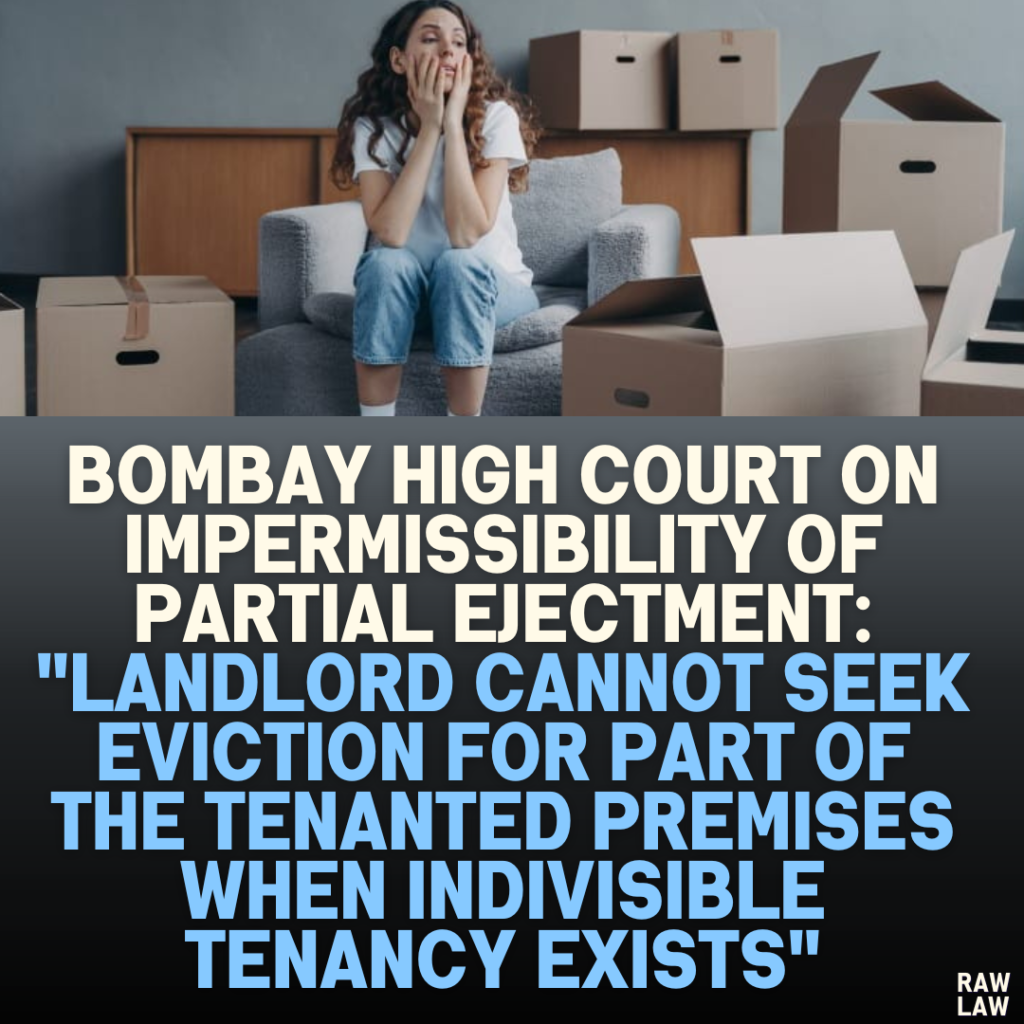Court’s Decision:
The Bombay High Court dismissed the landlord’s eviction suit because it sought partial eviction of the premises under a single, indivisible tenancy agreement. The court held that such an approach is contrary to established legal principles.
The court emphasized:
“Landlord cannot issue a demand notice or file a suit for partial eviction when the tenancy is indivisible and covers multiple parts of the property.”
Facts:
- The property involved, Supariwala Mansion, includes multiple shops and premises rented under an indivisible tenancy agreement.
- The original tenants were Ricardia and Archibald Annes. Following their deaths, disputes arose between their heirs over tenancy rights.
- The landlord filed a suit for eviction alleging arrears of rent for Shop No. 2 and the rear portion of Shop No. 1, ignoring other parts of the premises included in the original tenancy.
- The premises were historically let as a single unit, evidenced by joint rent receipts.
Issues:
The primary questions before the court were:
- Can the landlord seek eviction for only a portion of the premises when the tenancy agreement is indivisible?
- Does a notice demanding arrears for part of the premises comply with the legal requirements for eviction proceedings?
- Do partial agreements or possession changes among tenants affect the indivisibility of tenancy?
Petitioner’s Arguments:
The petitioner, a legal heir of one of the tenants, argued:
- Indivisible Tenancy: The tenancy agreement covered Shops No. 1, 2, 3, and associated premises. Partial eviction violates this indivisibility.
- Invalid Notice: The landlord’s demand notice pertained only to Shop No. 2 and a part of Shop No. 1, which rendered it legally invalid.
- Lack of Evidence: There was no legal documentation to prove the division of tenancy among heirs or that the petitioner surrendered tenancy rights for other parts of the property.
Respondent’s Arguments:
The landlord contended:
- Partial Surrender: Portions of the property had been surrendered or sub-let by the tenants, justifying partial eviction.
- Valid Notices: The demand notices were duly served and complied with the legal requirements.
- Consent Decrees: Earlier agreements between the tenants indicated a division of tenancy rights, supporting the landlord’s claim for partial eviction.
Analysis of the Law:
- Indivisibility of Tenancy: The Court relied on key precedents:
- Habibunnisa Begum v. Doraikannu Chettiar: Indivisible tenancy agreements cannot be split for partial ejectment.
- S. Sanyal v. Gian Chand: If a tenancy agreement is indivisible, the Court cannot split it for eviction of part of the premises.
- Demand Notice Requirements:
- Chimanlal v. Mishrilal: Notices demanding arrears must cover the entire premises, not just parts. A partial notice invalidates the suit.
- The Court reiterated that a valid demand notice is a prerequisite for initiating an eviction suit.
Precedent Analysis:
- Habibunnisa Begum v. Doraikannu Chettiar: The Court had ruled that partial ejectment violates the principle of indivisibility of tenancy.
- Chimanlal v. Mishrilal: The notice for arrears must refer to the entire tenancy, not just a fraction of it.
Court’s Reasoning:
The Court analyzed the facts and legal principles as follows:
- Tenancy Remained Indivisible: Historical rent receipts and earlier litigation confirmed that the tenancy agreement covered Shops No. 1, 2, 3, and other premises as a single unit.
- Defective Notice: The landlord’s notice only demanded rent for parts of the premises, violating the requirement for notices to cover the entire property.
- No Evidence of Division: The landlord failed to provide evidence of any lawful division of tenancy or consent for partial eviction.
- Invalid Suit: Without a valid notice for the entire premises, the eviction suit was not maintainable under the Maharashtra Rent Control Act, 1999.
Conclusion:
The Court dismissed the landlord’s eviction suit, holding:
- The demand notice was invalid as it pertained only to parts of the premises.
- A partial eviction suit under an indivisible tenancy agreement is impermissible.
Implications:
This ruling reinforces:
- Strict Compliance with Tenancy Law: Landlords must adhere to legal requirements, including issuing valid notices for the entire tenanted premises.
- Protection for Tenants: Tenants cannot be evicted piecemeal from properties governed by indivisible tenancy agreements.
- Clarity for Eviction Suits: The judgment provides clear guidance on maintaining suits for eviction under rent control laws.




Pingback: Supreme Court Overturns Karnataka High Court Order: Invalidates Appeal Due to 1,378-Day Delay and Non-Disclosure of Facts, Reiterates "A Litigant Must Approach the Court with Clean Hands" - Raw Law